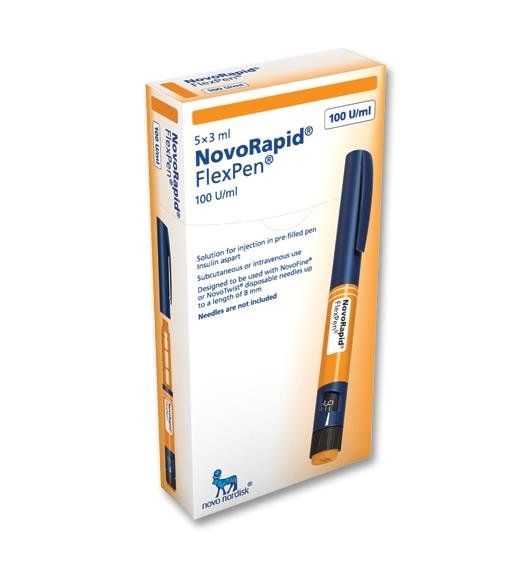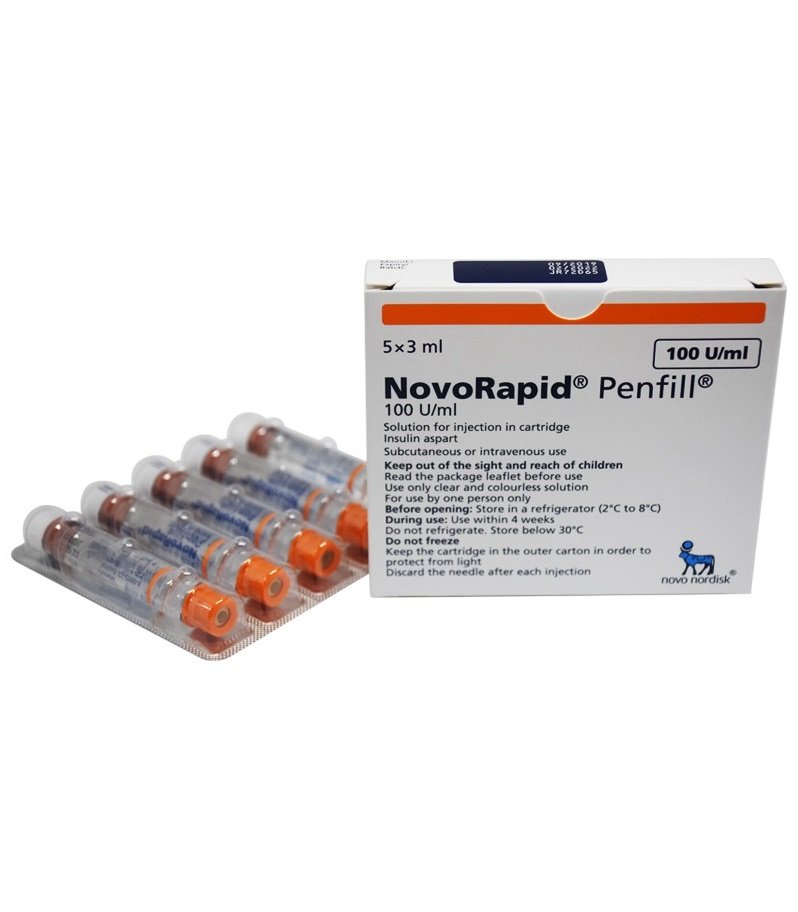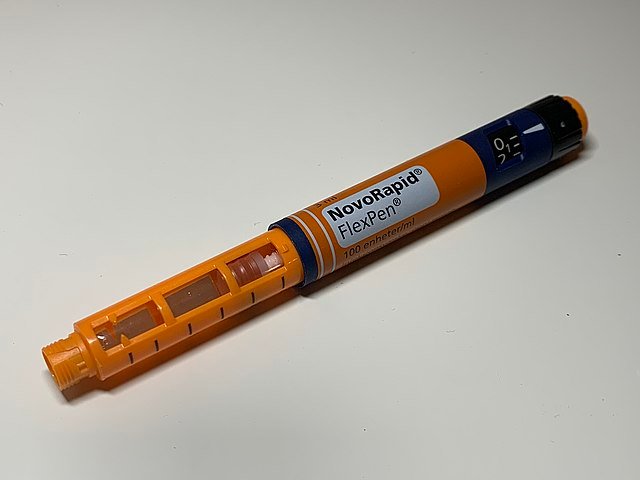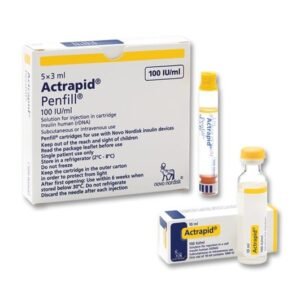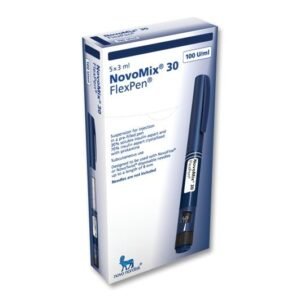What is Novorapid?
NovoRapid is modern, fast-acting insulin (insulin analog). Modern insulins are improved versions of human insulin.
How does it work?
The hypoglycemic effect of insulin aspartate is due to the fact that it facilitates the absorption of glucose by binding to insulin receptors in muscle and fat cells and at the same time that it inhibits hepatic glucose production.
NovoRapid produces a faster onset of action than soluble human insulin, as well as a lower glucose concentration, in evaluations performed during the first 4 hours after a meal. The duration of action of NovoRapid is shorter than that of human insulin after subcutaneous injection.
Blood glucose concentrations after a single preprandial dose of NovoRapid injected immediately before a meal (continuous curve) or soluble human insulin administered 30 minutes before a meal (dotted curve) in patients with type 1 diabetes. When NovoRapid is injected subcutaneously, the action begins 10 to 20 minutes after injection. The maximum effect is reached 1 to 3 hours after the injection. The duration of action is 3 to 5 hours.
What are the benefits of taking it?
NovoRapid is used to reduce high blood sugar levels in adults, adolescents, and children 1 year of age and older with diabetes mellitus (diabetes). Diabetes is a disease in which the body does not make enough insulin to control blood sugar levels. NovoRapid treatment helps prevent complications of diabetes.
NovoRapid will begin to lower your blood sugar levels within 10–20 minutes after administration and peak at 1 to 3 hours after injection, lasting 3–5 hours. Due to this short action, NovoRapid should normally be administered in combination with intermediate or long-acting insulin preparations. In addition, NovoRapid can be used for continuous subcutaneous insulin infusion.
How do I use it?
NovoRapid must be injected under the skin (subcutaneously) or by continuous infusion into an insulin pump. Your healthcare professional should teach you how to take insulin with a pump. You should never inject yourself directly into a vein (intravenously) or into a muscle (intramuscularly). If necessary NovoRapid can also be administered directly into a vein but can only be done by a doctor or other healthcare personnel.
At each injection, change the injection site within the specific area of skin that you usually use. This may reduce the risk of developing skin bumps or depressions. The best areas for injection are the front of your waist (abdomen), the upper arm, or the front of your thighs. Insulin will work more quickly if it is injected into the front of your waist. You should always regularly measure your blood sugar level.
NPH (Neutral Protamine Hagedorn) insulin is the only type of insulin that can be mixed with NovoRapid and the mixture must be injected immediately under the skin (subcutaneously). NovoRapid must be inserted into the syringe before withdrawing the NPH insulin.
How to use NovoRapid
If you use only one type of insulin
- Fill the syringe with an amount of air identical to the dose of insulin to be injected. Inject the air into the vial.
- Turn the vial and syringe upside down and load the syringe with the correct dose of insulin. Remove the needle from the vial. Eliminate the air from the syringe and check that the dose is correct.
If you have to mix two types of insulin
- Just before using, rotate the NPH insulin between your hands until the liquid is uniformly milky.
- Fill the syringe with an amount of air identical to the dose of NPH insulin. Inject the air into the vial containing the NPH insulin and withdraw the needle.
- Fill the syringe with an amount of air identical to the dose of NovoRapid. Inject the air into the vial containing NovoRapid. Turn the vial and syringe upside down and take the prescribed dose of NovoRapid. Remove the air from the syringe and check that the dose is correct.
- Insert the needle into the NPH insulin vial, invert the vial and syringe, and withdraw the prescribed insulin dose. Eliminate air from the syringe and check the dose. Inject the mixture immediately.
- Always mix NovoRapid and NPH insulin in the same order.
How to inject NovoRapid
- Inject insulin under the skin. Use the injection technique advised by your doctor or nurse.
- Keep the needle under your skin for at least 6 seconds, to make sure all the insulin has been injected.
- Discard the needle after each injection.
Its dosage
Follow the insulin administration and dose adjustment instructions exactly as prescribed by your doctor. If in doubt, ask your doctor, nurse or pharmacist.
NovoRapid should generally be administered immediately before meals. Take some food within 10 minutes of injection to avoid hypoglycemia. When necessary, NovoRapid can be administered immediately after a meal.
Do not change insulin unless your doctor tells you to. If your doctor changes you from one type or brand of insulin to another, you may need to adjust your dose.
Use in children and adolescents
NovoRapid can be used in adolescents and children 1 year of age and older instead of soluble human insulin when a rapid onset of action is preferred. For example, when the administration is difficult in relation to meals.
Use in special patient groups
If you have malfunctioning of the kidneys or liver, or if you are over 65 years old, you should check your blood sugar more frequently and consult with your doctor about changes in your insulin dose.
Side effects & precautions
Like all medicines, this medicine can cause side effects, although not everybody gets them.
- a) Summary of serious and very frequent adverse effects
Low blood sugar (hypoglycemia) is a very common side effect. It can affect more than 1 in 10 people.
Low blood sugar levels can appear if:
- too much insulin is injected;
- eat too little or skip a meal;
- exercise more than usual;
- drink alcohol.
Warning symptoms of low blood sugar: cold sweat, cold and pale skin, headache, palpitations, nausea, excessive hunger, temporary changes in vision, drowsiness, tiredness and unusual weakness, nervousness or tremor, anxiety, confusion, and difficulty concentrating.
A severe drop in blood sugar can lead to loss of consciousness. If a severe and prolonged drop in blood sugar is not treated, it can cause brain injury (transient or permanent) and even death. You can regain consciousness more quickly if a person who knows how to do it is given a glucagon injection. If you are given glucagon, you should take glucose or a sugary product as soon as you regain consciousness. If you do not respond to glucagon treatment, you will need to be treated in a hospital.

